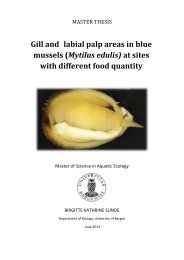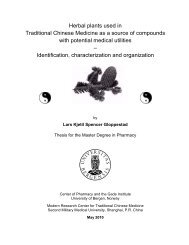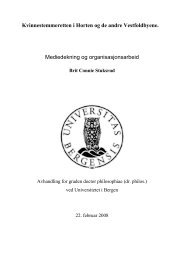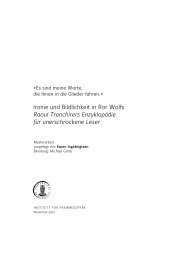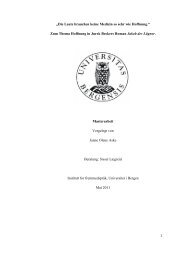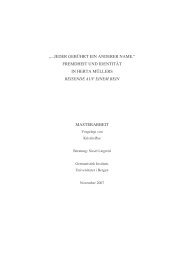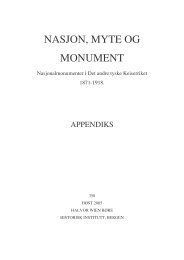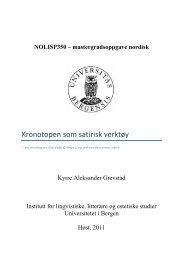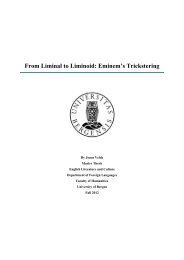Eiliv Vinje - Universitetet i Bergen
Eiliv Vinje - Universitetet i Bergen
Eiliv Vinje - Universitetet i Bergen
You also want an ePaper? Increase the reach of your titles
YUMPU automatically turns print PDFs into web optimized ePapers that Google loves.
190 KAP. 5.1<br />
another, so is it fuller of change; The Heavens themselves continually turn, the Stars<br />
move, the Moon changeth; Fire whirleth, Aire flyeth, Water ebbs and flowes, the face of<br />
the Earth altereth her looks, time staies not; the Colour that is most light, will take most<br />
dyes: so in Men, they that have the most reason are the most alterable in their<br />
designes, and the darkest and most ignorant, do seldomest change; therefore Women<br />
changing more than Men, have also more Reason. They cannot be immutable like<br />
stocks, like stones, like the Earths dull Center; Gold that lyeth still, rusteth; Water,<br />
corrupteth; Aire that moveth not, poysoneth; then why should that which is the<br />
perfection of other things, be imputed to Women as greatest imperfection? Because<br />
thereby they deceive Men. Are not your wits pleased with those jests, which cozen<br />
your expectation? You can call it pleasure to be beguil'd in troubles, and in the most<br />
excellent toy in the world, you call it Treachery: I would you had your Mistresses so<br />
constant, that they would never change, no not so much as their smocks, then should<br />
you see what sluttish vertue, Constancy were. Inconstancy is a most commendable and<br />
cleanly quality, and Women in this quality are far more absolute than the Heavens,<br />
than the Stars, Moon, or any thing beneath it; for long observation hath pickt certainty<br />
out of their mutability. The Learned are so well acquainted with the Stars, Signes and<br />
Planets, that they make them but Characters, to read the meaning of the Heaven in his<br />
own forehead. Every simple fellow can bespeak the change of the Moon a great while<br />
beforehand: but I would fain have the learnedst man so skilfull, as to tell when the<br />
simplest Woman meaneth to vary. Learning affords no rules to know, much less<br />
knowledge to rule the minde of a Woman: For as Philosophy teacheth us, that Light<br />
things do always tend upwards, and heavy things decline downward; Experience teacheth<br />
us otherwise, that the disp osition of a Light Woman, is to fall down, the nature of<br />
women being contrary to all Art and Nature. (Donne 1994, 280-81.)<br />
Den tesen som Malloch legg til grunn for lesinga, er at paradokset har ei kjerne av<br />
tvetydighet ("a central pivot of equivocation") der to argument som logisk ikkje heng<br />
saman, møtest (Malloch 1956, 194). Ei paradoks argumentasjonsform inneheld såleis<br />
ein serie av slike tvetydige kjernepunkt.<br />
Nå til teksten: Først hevdar paradoksisten - på grunnlag av den innleiande<br />
tesen om at det som er omskifteleg, er betre enn det som er konstant - at det er dei<br />
menneska (Men) som tenkjer mest, som også vil skifta mest i sine planar og utkast. På<br />
grunnlag av dette sluttar han at kvinner, ettersom dei er meir omskiftelege enn<br />
menn, også må vera meir fornuftge enn dei. Det tvetydige dreiepunktet er knytt til<br />
orda "alterable" og "changing "; endring kan vera resultat av fornuftig tanke, men<br />
kan også vera resultat av det ufornuftige og vilkårlege. Det er denne tvetydigheten<br />
som gjer det mogleg å binda saman to forskjellige argument.<br />
Eit stykke lenger nede i det siterte utdraget blir ordet "change" på ny brukt<br />
tvetydig: "I would you had your Mistresses so constant, that they would never<br />
change, no not so much as their smocks, then should you see what sluttish vertue,<br />
Constancy were." I dette tilfellet dreiar tvetydigheten seg om verbets



